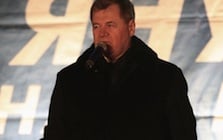 |
|
Yanukovych: Taking the soft option ( |
The Ukraine in December secured a $15 billion bailout from Russia, along with a promise that the price for Russian gas imports will by slashed by about one-third.
So, is this a good thing or a bad thing?
The agreement has infuriated the countrys pro-democracy supporters, who are tired of serving their overlords in Moscow. In the meantime, the man who brokered the deal with Russia, Ukraine President Viktor Yanukovych, has become a mystery wrapped inside a riddle. One day hes pushing Russia away and cozying up to the EU, the next hes snubbing Europe and embracing Moscow as his new best friend.
To understand Yanukovychs seemingly irrational behavior, whats needed here is a reality check. The Ukraine is a deeply troubled country teetering on the brink of economic collapse. It has few available options, and while it has avoided insolvency so far, it could default on its debt in 2014 that is, without continued assistance from brother Russia.
What the Ukraine most needs right now is a program of bottom-up macroeconomic reforms. That means an end to propping up its artificially high currency, slashing ruinous budget deficits and opening its markets to freer trade and competition. In the short run, though, such a tack would likely mean higher unemployment and red ink at industries dependent on government subsidies and other forms of protection.
But the Ukraine is doing itself no favors by avoiding meaningful change. In recent weeks, for example, the countrys intervention in currency markets has dramatically pushed up borrowing costs, signaling that the governments efforts to prevent a devaluation of the hryvna are creating cash shortages.
That, in turn, is disrupting normal business activity in the country, and could lead to both an inflationary spiral and a flight of capital.
The trouble is that Yanukovych does not have the political will nor clout to embark on the economic reforms his country so desperately needs. His fear is that the same people currently denouncing financial aid from Moscow would be attacking him for unleashing a wave of painful restructuring. And fiscal reform offers no guarantee of a payoff down the road.
Prior to its deal with Moscow, Kiev was in urgent need of a cash infusion to keep the countrys economy afloat. But Yanukovych stubbornly refused to accept bailout conditions set by the International Monetary Fund. Instead, he chose to take a $15-billion lifeline from Moscow, which is nothing more than a financial band-aid. Apparently, Yanukovych had decided that its preferable to take his marching orders from Russian President Vladimir Putin rather than the IMF and EU, despite accusations that he has sold his country out to Moscow.
Now the question is: What will Putin demand from Ukraine for continued financial support? And will Ukrainians be so incensed by Yanukovychs nod to cronyism that they will throw their unpopular president out of office?
At present the deal does not address the question of the Ukraines membership in a Russian-led customs union comprised of former Soviet republics. But there is no doubt that Putin is determined to keep Ukraine in Russias sphere of influence, and that he will bring pressure to bear on Yanukovych to join his free-trade bloc in the coming year.
By making a deal with the devil he knows, Yanukovych may have unwittingly sealed the Ukraines future for decades to come.



